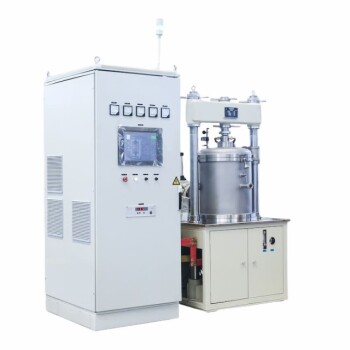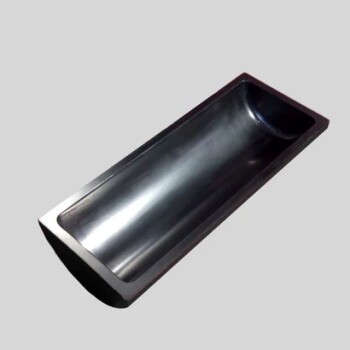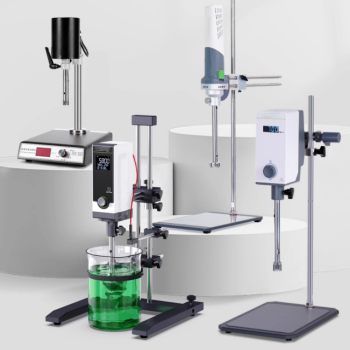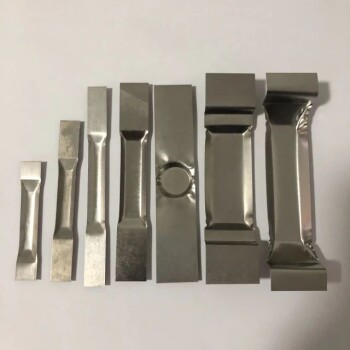In a standard laboratory setting, a bacterial incubator is most commonly maintained at 37°C (98.6°F). This specific temperature is not arbitrary; it is deliberately chosen because it mimics the core body temperature of humans. Consequently, it provides the ideal growth conditions for the vast majority of medically relevant bacteria, which are the primary focus of clinical and research microbiology.
The core principle is that temperature governs the speed of the enzymatic reactions essential for bacterial life. While other temperatures are used for specialized bacteria, the 37°C standard is chosen because it represents the optimal growth point for mesophiles—the group of bacteria that includes most human pathogens like E. coli and Staphylococcus.
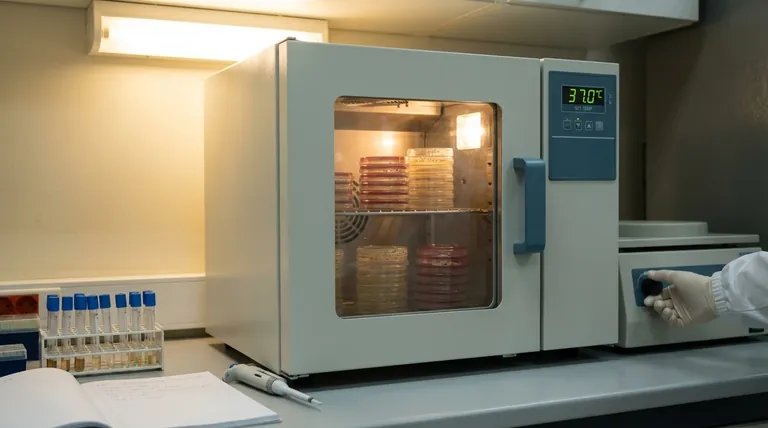
The Critical Link: Temperature and Bacterial Metabolism
The temperature of an incubator is arguably the single most important parameter for cultivating bacteria. It directly controls the rate of growth, metabolic activity, and even the expression of certain genes.
Enzymes: The Engines of Bacterial Growth
Every vital process in a bacterium—from absorbing nutrients to replicating its DNA—is driven by enzymes. These proteins act as biological catalysts, speeding up chemical reactions that would otherwise happen too slowly to sustain life.
Enzyme function is exquisitely sensitive to temperature. Think of it as an engine's performance curve. There is a specific temperature at which the engine runs most efficiently.
The 'Goldilocks' Principle of Temperature
For bacteria, temperature operates on a "Goldilocks" principle. There is an optimal range where growth is fastest.
- Too Cold: At low temperatures, enzymatic reactions slow down significantly. The bacteria do not die but enter a state of near-dormancy, with minimal growth. This is the principle behind refrigeration.
- Too Hot: As temperature rises past the optimum, enzymes begin to denature. Their precise three-dimensional structure unravels, rendering them non-functional. This damage is typically irreversible and leads to cell death.
Why 37°C Became the Universal Standard
The choice of 37°C is a direct reflection of the goals of modern microbiology. For over a century, the primary focus has been on understanding, diagnosing, and treating infectious diseases in humans.
Mimicking the Human Host Environment
Since the normal internal temperature of a healthy human is 37°C, this is the environment in which pathogenic bacteria have evolved to thrive. Incubating them at this temperature in the lab allows us to observe their natural growth patterns, test their susceptibility to antibiotics, and study their disease-causing mechanisms under relevant conditions.
The World of Mesophiles
Bacteria are broadly classified by their preferred temperature range. Those that grow best in moderate temperatures, typically between 20°C and 45°C, are called mesophiles (from the Greek meso, meaning "middle").
This group includes the vast majority of bacteria that live in and on the human body, both as harmless commensals and as dangerous pathogens. Therefore, 37°C is the default setting for any work involving human-centric microbiology.
Understanding Exceptions and Trade-offs
While 37°C is the standard, it is crucial to recognize that it is not a one-size-fits-all solution. Using the wrong temperature is a common source of experimental failure.
Psychrophiles: The Cold-Lovers
Some bacteria, known as psychrophiles, are adapted to cold environments. They are often studied in the context of food spoilage or environmental science.
Incubating these organisms, such as Listeria monocytogenes or certain Pseudomonas species, may require temperatures of 4°C (refrigeration), 20-25°C (room temperature), or another value matching their natural habitat. Incubating them at 37°C would likely kill them.
Thermophiles: The Heat-Lovers
Conversely, thermophiles thrive at high temperatures, often found in hot springs, compost piles, or deep-sea hydrothermal vents.
A classic example is Thermus aquaticus, which grows optimally around 70°C. Its heat-stable DNA polymerase enzyme is the cornerstone of the Polymerase Chain Reaction (PCR), a revolutionary technique in molecular biology. Attempting to grow it at 37°C would result in no growth at all.
The Impact of Incorrect Incubation
Choosing the wrong temperature can have significant consequences:
- No Growth: The culture may fail entirely if the temperature is outside the organism's viable range.
- Slow Growth: Sub-optimal temperatures lead to longer incubation times and can skew results in quantitative experiments.
- Atypical Behavior: Temperature can influence which genes a bacterium expresses, potentially altering its virulence, colony appearance, or metabolic output.
Setting the Right Temperature for Your Goal
The correct incubator temperature is dictated entirely by the specific organism you are studying and the question you are trying to answer.
- If your primary focus is clinical microbiology or human pathogens: Set your incubator to 37°C to simulate the conditions of the human body.
- If your primary focus is general environmental microbiology: Use a temperature that reflects the source environment, often 20°C to 25°C for soil or water samples.
- If your primary focus is food spoilage under refrigeration: Use an incubator set to 4°C to study the growth of psychrotolerant organisms.
- If your primary focus is specialized research on extremophiles: You must use the specific optimal temperature for that organism, which could be as high as 55°C, 70°C, or even hotter.
Ultimately, matching the incubation temperature to the bacterium's natural optimum is the foundation of reliable and reproducible microbiology.
Summary Table:
| Temperature Setting | Bacterial Group | Primary Application |
|---|---|---|
| 37°C (98.6°F) | Mesophiles (e.g., E. coli, Staphylococcus) | Clinical microbiology, human pathogen studies |
| 4°C - 25°C | Psychrophiles / Psychrotolerants | Food spoilage, environmental samples |
| 55°C - 70°C+ | Thermophiles (e.g., Thermus aquaticus) | Specialized research, extremophile studies |
Ensure precise and reliable incubation for your microbiology work. KINTEK specializes in high-performance laboratory incubators and consumables, providing the exact temperature control and uniformity needed for cultivating mesophiles, psychrophiles, and thermophiles. Whether you're in clinical diagnostics, environmental testing, or specialized research, our equipment delivers the reproducibility your lab demands. Contact our experts today to find the ideal incubator for your specific bacterial strains and research goals!
Visual Guide
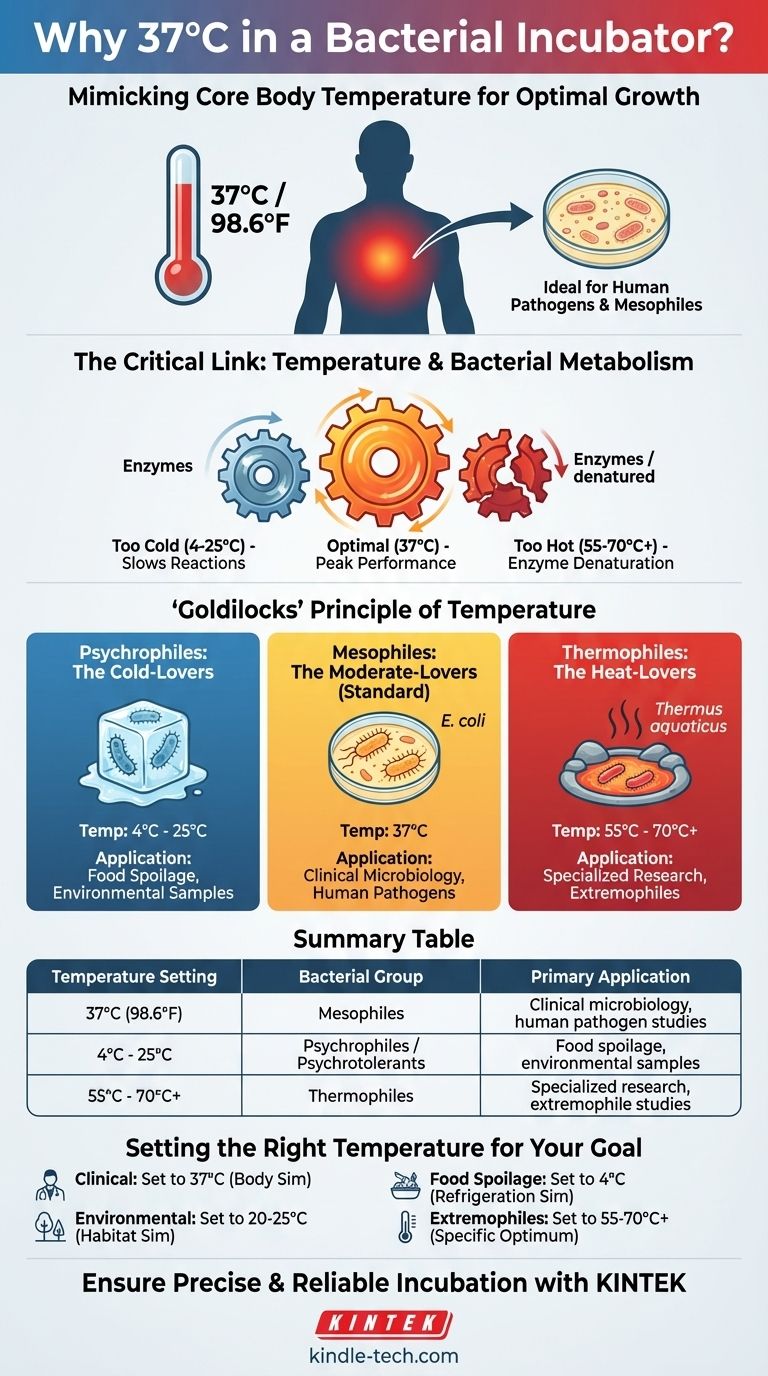
Related Products
- Double Plate Heating Press Mold for Lab
- Laboratory High Pressure Vacuum Tube Furnace
- Single Punch Electric Tablet Press Machine Laboratory Powder Tablet Punching TDP Tablet Press
- Laboratory Hybrid Tissue Grinding Mill
- Automatic Laboratory Heat Press Machine
People Also Ask
- Why is it necessary to use high-precision temperature-controlled heating furnaces? Secure Natural Fiber Integrity.
- How is conventional heating different from induction heating? Direct vs. Indirect Heat Explained
- What are the different types of press machines? Choose the Right Heating Tech for Your Application
- What is the temperature range for compression molding? Optimize Your Process for Perfect Parts
- What is a heated hydraulic press used for? Essential Tool for Curing, Molding, and Laminating







